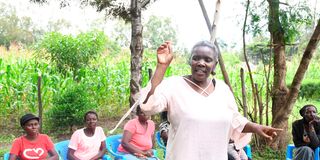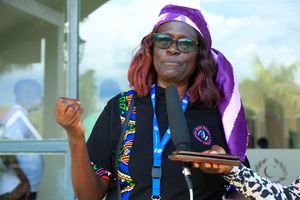How locals are fighting Aids from within

Merab Oguna engages community members in talks about HIV in Kisumu East on November 17, 2023.
What you need to know:
- The country projects to end new HIV transmission by 2030.
- During World Aids Day on Friday, discussions will be centred on unleashing the full potential of community leadership to put an end to Aids.
About two decades ago, HIV was considered a death sentence. Anyone who tested positive for the virus was left to die. Friends and family would run away when they were told that someone had been infected with the virus.
It led to a lot of stigma in most communities, especially around the lake region where the virus was widespread. In Nyanza, a region that is still leading in HIV prevalence and new transmissions, more and more people are now accepting the reality and embracing people who test positive.
In Kisumu East, a group of elderly men and women, who are living positively, have taken the personal initiative of educating communities around them about HIV and how people living with it need to be assisted. Some of them have lived with the virus for more than 20 years. Among them is Ms Dorine Oyuga.
She was found to be infected in 1999 when she was 28 years old. This happened when she went to the prenatal clinic at Jaramogi Oginga Odinga Teaching and Referral Hospital. “I was among people who discovered that I was infected during my visit to the hospital for child delivery,” Ms Oyuga recalls.
She says most women who got infected around that time discovered their condition at the antenatal clinics. “Some would fail to tell their husbands about their condition until they started developing complications. It led to family breakups as couples would accuse each other of infidelity,” she says.
Ms Oyuga is a member of an umbrella body called the Network for People Living with HIV, which she uses to reach out to communities around her. It brings together HIV patients who share their stories with others. One of the messages they like sharing is for people living with the virus to adhere to anti-retroviral therapy and maintain a good lifestyle.
“Anyone suffering from HIV is prone to opportunistic infections. We try to tell them to obey directions issued by the doctor to prolong their lives,” Ms Oyuga says. She also encourages expectant women to seek skilled delivery if they are HIV-positive to avoid transmission of the virus to their babies. She has been working alongside Ms Merab Oguna, who has lived with HIV for 22 years.
Ms Oguna was diagnosed with the disease when she was 28 years old and recalls seeing people who died from the disease being carried in body bags as everyone thought it could be transmitted by touch. Other people developed complications in their bodies after being diagnosed. “Most of them were suffering from opportunistic infections because access to HIV management drugs was difficult at first,” she says.
During her journey with HIV, Ms Oguna recalls being diagnosed with TB twice. She also contracted pneumonia. Today, both Ms Oyuga and Ms Oguna have taken the bold step of telling people their journey in life and trying to educate them about HIV. According to the National Syndemic Disease Control Council (NSDCC), Kenya currently has at least 1.4 million people living with HIV.
Homa Bay leads in prevalence at 15.2 per cent. Kisumu comes second at 14.5 per cent. Siaya and Migori have a prevalence of 13.2 per cent and 9.7 per cent respectively. The country projects to end new HIV transmission by 2030. During World Aids Day on Friday, discussions will be centred on unleashing the full potential of community leadership to put an end to Aids. The theme for this year is: “Let Communities Lead”.
Ms Oguna says champions like her need to be supported in ensuring the virus is kicked out of the country. Médecins Sans Frontières (Doctors without Borders) Homa Bay county project coordinator Bright Mukhuna says having the community take the lead in the war against HIV is one of the best approaches to fighting the virus.
He says MSF advocates for patients to take care of other patients. “We offer training programmes where patients are involved in fighting the disease at the community level. It is a good initiative that the county should champion,” Mr Mukhuna says. MSF has been operating in Homa Bay for the past 25 years, where it has been involved in fighting HIV. It has now shifted focus to non-communicable diseases like diabetes.
According to Justus Olando, the HIV programme officer in the county government of Kisumu, if a person follows their doctor's advice, they have reduced chances of transmitting the disease. He explains that taking ARV drugs on time and maintaining a good diet allow people living with the virus to live longer.
“Undetectable is equal to untransmittable. At the community, we focus on encouraging people living with HIV to have access to drugs and adhere to their medication and achieve viral suppression,” Mr Olando says. He notes that low viral load reduces chances of HIV transmission to HIV-negative partners, improves quality and prolonged life and enhances productivity.
Another HIV prevention measure he is advocating for is voluntary medical male circumcision, which reduces chances of transmission by 60 per cent among sexually active men. Mr Olando explains that reduced occurrence of penile and cervical cancer as well as addressing penile complications such as phimosis, paraphimosis and balanitis can stem the spread.
Homa Bay County Health Chief Officer Kevine Osuri says the lake region has several risk factors like early sexual debut, sex-for-fish, poor socio-economic status that escalates transmission of the virus. “Other factors like serial and gender-based violence further worsen the situation. There needs to be a solution to these problems,” he says. He calls for collaboration between different stakeholders in fighting the virus.
Homa Bay County HIV coordinator Omondi Obunga says teenagers contribute a high percentage of new infections. He, however, says Homa Bay is headed in the right direction, judging by reduced prevalence over the years. “Our graph shows that fewer people are getting the virus. We encourage residents to adhere to guidelines issued by health experts,” Mr Obunga says.




